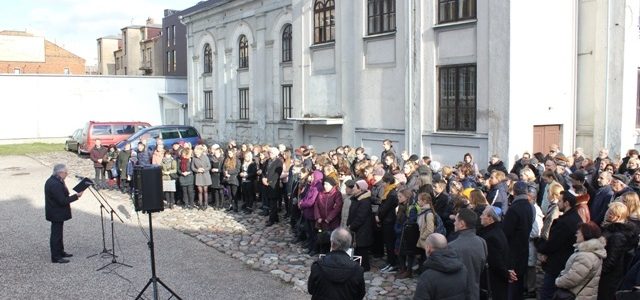This year marked the 75th anniversary of the horrific Children’s Aktion [mass murder operation] in the Kaunas ghetto. This year as in past years the event was commemorated at Robertas Antinis’s statue Torah of the Children, with an expanded commemoration to mark the milestone date at the J. Gruodis Concert Hall.
Lithuanian actor Aleksandras Rubinovas read excerpts from eye-witnesses and historians about what happened on March 27, 1944: “The aktion commanded by oberfuehrer Fuchs and oberscharfuehrer Kittel, was conducted in order to transform the ghetto into a concentration camp where only those fit for work would be held; the children and elderly were supposed to be liquidated.”
A passage from the book “Išgelbėti bulvių maišuose” [Rescued in Potato Sacks], a collection of memoirs by survivors rescued as children from the Kaunas ghetto: “We saw a bus. There was loud music coming from it which was supposed to drown out the children’s screams, the begging of the mothers and the barking of the dogs. Drunken berserk Ukrainians wielding axes and crowbars hunted the children and elderly out of their hiding places. The atrocities ended at about sunset.
“Parents returning from forced labor found the ghetto in disarray. A neighbor woman hung a bag of cloths with her three-year-old daughter hidden inside on a shelf. A German soldier looking for children slashed the bag with his whip but didn’t discover anything. This caused dust to rise and the soldier left the room in a hurry. Untying the bag, the mother found her daughter curled up with a deep wound in her back. The mother burst into tears, but the little girl, whose name seems to have been Gita, said: ‘Don’t cry, mommy, it doesn’t hurt.'”
Fruma Kučinskienė, a Kaunas ghetto survivor who lost her entire family, spoke about the unbelievable cruelties and the incredible pain of the parents who lost their children. She said it was also Lithuania’s loss that so many citizens who might have become wonderful doctors, attorneys, musicians or simply good people were murdered. Kaunas Jewish Community chairman Gercas Žakas and Israeli ambassador to Lithuania Amir Maimon also addressed the large audience of Jewish community members, Israeli exchange students and Lithuanian students and teachers from the Balbieriškis School along with many local residents of Kaunas.
Kaunas Hassidic Synagogue Religious Association chairman Iseris Šreibergas ended the ceremony with a prayer for the dead followed by a brief reading of the names of the children who were murdered in the Kaunas ghetto. Some students wrote some of the names on stones.
Lithuanian Jewish Community executive director Renaldas Vaisbrodas and Gercas Žakas placed a wreath at the statue in memory of the dead accompanied the reading of short statement by LJC chairwoman Faina Kukliansky who was unable to attend this year.
The commemoration continued at the J. Gruodis Conservatory where the students’ string orchestra performed a concert in memory of the murdered children, conducted by Kristina Domarkienė, with additional performances by baritone Giedrius Prunskas and the Aušra Gymnasium theater studio. Rubinovas then read an emotional letter by former resident of Kaunas now living in Israel Dusia Krechmerbe to her brother who died in the Kaunas ghetto and whom she had never met, having been born after the war.



![Vaikų akcijaIMG_0627[1]](https://www.lzb.lt/wp-content/uploads/2019/04/Vaikų-akcijaIMG_06271-1-150x150.jpg)
![Vaikų akcijaIMG_0626[1]](https://www.lzb.lt/wp-content/uploads/2019/04/Vaikų-akcijaIMG_06261-1-150x150.jpg)
![Vaikų akcijaIMG_0622[1]](https://www.lzb.lt/wp-content/uploads/2019/04/Vaikų-akcijaIMG_06221-1-150x150.jpg)
![vaikų akcijaIMG_0618[1]](https://www.lzb.lt/wp-content/uploads/2019/04/vaikų-akcijaIMG_06181-1-150x150.jpg)
![Vaikų akcijaIMG_0613[1]](https://www.lzb.lt/wp-content/uploads/2019/04/Vaikų-akcijaIMG_06131-1-150x150.jpg)
![Vaikų akcijaIMG_0603[1]](https://www.lzb.lt/wp-content/uploads/2019/04/Vaikų-akcijaIMG_06031-1-150x150.jpg)
![Vaikų akcijaIMG_0594[1]](https://www.lzb.lt/wp-content/uploads/2019/04/Vaikų-akcijaIMG_05941-1-150x150.jpg)
![Vaikų akcijaIMG_0580[1]](https://www.lzb.lt/wp-content/uploads/2019/04/Vaikų-akcijaIMG_05801-1-150x150.jpg)
![Vaikų akcijaIMG_0573[1]](https://www.lzb.lt/wp-content/uploads/2019/04/Vaikų-akcijaIMG_05731-1-150x150.jpg)
![Vaikų akcijaIMG_0568[1]](https://www.lzb.lt/wp-content/uploads/2019/04/Vaikų-akcijaIMG_05681-1-150x150.jpg)
![Vaikų akcijaIMG_0564[1]](https://www.lzb.lt/wp-content/uploads/2019/04/Vaikų-akcijaIMG_05641-1-150x150.jpg)
![Vaikų akcijaIMG_0563[1]](https://www.lzb.lt/wp-content/uploads/2019/04/Vaikų-akcijaIMG_05631-1-150x150.jpg)
![Vaikų akcijaIMG_0554[1]](https://www.lzb.lt/wp-content/uploads/2019/04/Vaikų-akcijaIMG_05541-1-150x150.jpg)
![Vaikų akcijaMG_0546[1] (1)](https://www.lzb.lt/wp-content/uploads/2019/04/Vaikų-akcijaMG_05461-1-1-150x150.jpg)
![Vaikų akcijaMG_0537[1]](https://www.lzb.lt/wp-content/uploads/2019/04/Vaikų-akcijaMG_05371-1-150x150.jpg)
![Vaikų akcijaIMG_0526[1]](https://www.lzb.lt/wp-content/uploads/2019/04/Vaikų-akcijaIMG_05261-1-150x150.jpg)
![IVaikų akcijaMG_0523[1]](https://www.lzb.lt/wp-content/uploads/2019/04/IVaikų-akcijaMG_05231-1-150x150.jpg)
![Vaikų akcijaIMG_0514[1]](https://www.lzb.lt/wp-content/uploads/2019/04/Vaikų-akcijaIMG_05141-1-150x150.jpg)
![Vaikų akcijaIMG_0511[1]](https://www.lzb.lt/wp-content/uploads/2019/04/Vaikų-akcijaIMG_05111-1-150x150.jpg)
![Vaikų akcija IMG_0504[1]](https://www.lzb.lt/wp-content/uploads/2019/04/Vaikų-akcija-IMG_05041-1-150x150.jpg)